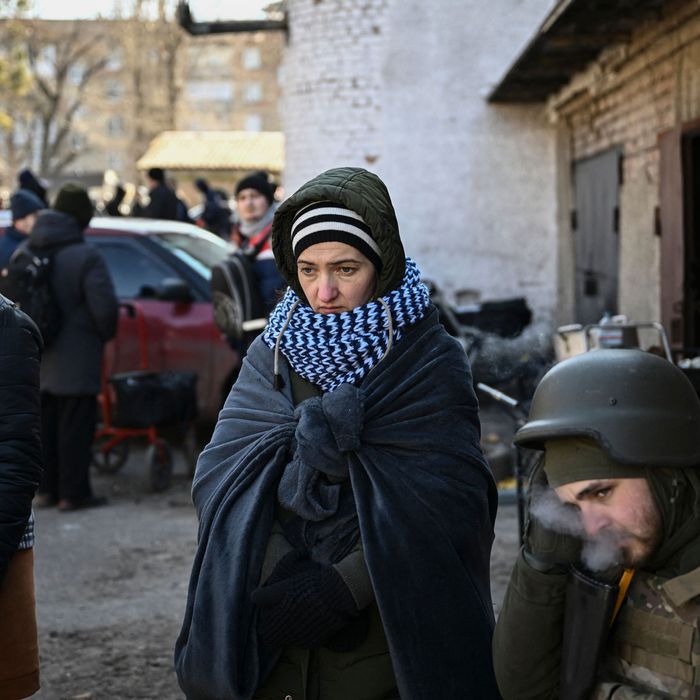
In less than two weeks, Russia’s invasion of Ukraine has gone from regional conflagration to global crisis. The heroic resistance of the Ukrainian people, imperial intransigence of Vladimir Putin, and moral fervor of Western publics have collectively brought humanity to the brink of an economic disaster, if not World War III.
By mobilizing in defense of their fledgling democracy, the Ukrainians thwarted both Moscow’s hopes of a swift victory and the West’s tacit plan for a tepid protest against Russian aggression. Initially, Joe Biden and his European counterparts had tried to strike a balance between punishing the Kremlin’s crimes and safeguarding commodities markets. But the spectacle of Ukraine’s defiance — from a president refusing to put his own personal safety above solidarity with his besieged nation, to millions of ordinary Ukrainians taking up arms and Molotov cocktails to defend the West’s ostensible ideals — quickly made such a balancing act untenable. Calls for aid to Ukraine have reverberated throughout the U.S. and E.U., growing steadily louder with each demonstration of Moscow’s brutality.
On Tuesday, the United States banned imports of Russian oil, closing one of the few remaining loopholes in its economic blockade of a country that exports a large share of the world’s energy, wheat, and metals. On Friday, the U.S. signaled that it would join the E.U. and other members of the G7 in suspending normal trade relations with Russia altogether. The impact of these unprecedented sanctions will be felt far beyond Russia’s borders. The removal of large quantities of Russian energy and agricultural products from the global market is already putting upward pressure on global food prices, which hit a record high last month. Even before the present crisis, millions in Afghanistan were at risk of famine. Now, deaths from starvation are poised to spike, while more mundane material hardships ripple out across the Global North. And the economic outlook is liable to get worse before it gets better, as the Kremlin is signaling that it will soon unveil retaliatory sanctions.
This escalation in economic conflict threatens to presage the military variety. Calls for the West to establish “a no-fly zone” — which is to say, to adopt a policy of shooting down any Russian plane that enters Ukrainian airspace — have spread from leaders in Kyiv to Western activists to American foreign-policy elites. Thus far, the White House has been adamant in its opposition to a direct military conflict between NATO and Russia, a confrontation that would be tantamount to a world war between nuclear powers. Yet the line between aiding Ukraine’s war effort and joining the war itself is thin.
Thus, the conflict’s current trajectory is leading the world toward the “lose-lose” scenario of a global recession, while also increasing the tail risk of nuclear war. It is not clear how either side intends to avert disaster, let alone secure a victory.
To no small extent, Russia’s war is already lost. Its invasion was premised on a conception of Ukraine that Volodymyr Zelenskyy and his constituents instantly falsified. Putin and his intelligence agents saw Ukrainian nationalism in general — and its liberal democratic variant in particular — as Western imports foisted upon an indifferent market. They thought paratroopers could subdue Kyiv in a matter of days. They imagined that Ukrainians would see a Russian puppet government as only marginally less legitimate than the Potemkin state that Washington had supposedly built for them. And they deemed the West too dependent on Russian energy and deferential to domestic investors to put up much of a fight. On all counts, they were wrong.
These miscalculations leave Putin with a pair of unpalatable options. He can either abandon his initial war aims and settle for concessions that don’t come close to offsetting his misadventure’s costs, or he can reduce Ukraine to rubble, build a reviled puppet government atop it, and squander his nation’s shrinking resources on a bloody perpetual counterinsurgency. Putin would be wise to opt for strategic retreat over the pursuit of that pyrrhic “victory.” But who today would bet on Putin’s wisdom or foresight?
If Russia’s endgame is mysterious, the West’s is about as opaque. Over the past two weeks, the U.S. and Europe have rapidly escalated their economic war on Russia, crossing lines that were unthinkable in the conflict’s early days. The strategic logic behind these moves — which is to say, the theory for how immiserating Russia will preserve an independent Ukraine — remains largely unspecified. And there is reason to fear that the West’s escalations reflect domestic political pressures more than cool-headed diplomatic calculation. For a White House that is eager to demonstrate American leadership on the global stage, but loath to entangle U.S. troops in another far-flung conflict, ever-more punishing sanctions may have simply been the path of least resistance, no matter where it appeared to lead.
This isn’t to say that the West’s approach lacks any plausible rationale. The present sanctions doubtlessly serve as a deterrent against future wars of conquest. If this were their sole purpose, however, it could likely be achieved at a less exorbitant cost to global prosperity. Other traditional aims of economic warfare are to coerce an aggressor into a peace settlement, or to undermine their material capacity for waging war. Unfortunately, there is cause for doubting the sanctions’ efficacy on both these fronts.
In testimony before the House on Tuesday, Director of National Intelligence Avril Haines said that the speed and severity of the West’s sanctions had taken Moscow by surprise. Nevertheless, Haines continued, “Our analysts assess that Putin is unlikely to be deterred by such setbacks and instead may escalate, essentially doubling down.” This revelation — that draconian sanctions have done more to inflame Putin’s aggression than temper it — made little impression on the lawmakers. Asked after the hearing about his vision for an “off-ramp” from the conflict, House Intelligence Committee chair Adam Schiff replied, “I think what we can do is just to continue to escalate the price that [Putin] and Russia have to pay for this. I think until he feels that his own regime is at risk, it’s hard to see him looking for an exit ramp.”
Schiff’s analysis is unsatisfying on multiple levels. For one thing, if our sanctions won’t pay dividends until they’ve destabilized Putin’s regime, then they may never do so. Historically, economic warfare has often led targeted societies to direct their anger away from domestic leaders and toward foreign sanctioners. And Putin’s Russia seems an especially inauspicious context for fomenting insurrection via blockade. Russia’s leader has spent two decades fortifying his personalist dictatorship against mass unrest and elite discontent. Thanks in part to the Kremlin’s stranglehold on information, 58 percent of Russians expressed support for the war in Ukraine in a recent survey conducted by independent researchers. And the war’s detractors cannot voice their opposition without risking imprisonment, while independent journalism inside the country has now been effectively banned. Russia’s oligarchs, meanwhile, are now more dependent on Putin than he is on their approval. Today’s Russian kleptocrats owe their wealth primarily to state-run firms rather than independent fortunes. For many, monetizing their personal connections to Putin’s Kremlin is a vital revenue stream. The dictator’s fall would therefore jeopardize their own economic power, while potentially exposing them to corruption investigations.
For these reasons, Schiff’s proffered strategy is likely to fail. Yet that may be less concerning than the possibility that it might succeed. According to a recent report from Chris Chivvis, the former U.S. national intelligence officer for Europe, the U.S. government conducted “scores of war games” in the wake of Putin’s 2014 invasion of Crimea, exercises intended to clarify the likely consequences of various forms of escalation, given the best available intelligence. Among those simulations’ firmest conclusions, in Chivvis’s telling: “Putin would probably use a nuclear weapon if he concludes that his regime is threatened.”
In other words, judging by Schiff’s remarks, the objective of our government’s sanctions policy is to engineer a circumstance in which our government believes that Moscow would “probably” start a nuclear war.
The strongest rationale for the West’s sanctions is that they will limit the resources available for Russian war-making. But this, too, risks unintended consequences. As U.S. Naval War College professor Erik Sand and MIT political scientist Suzanne Freeman have noted, “economic isolation rarely causes its targets to capitulate outright,” and often leads “states at war to adopt riskier strategies.” This is because economic warfare works on a delay. The targeted military’s present capacities are unaffected, while its future strength comes into question. In this context, military leaders find themselves facing “a closing window in which to try to avert the disaster they see coming,” and frequently do so through escalatory violence.
It is possible that draconian sanctions are the best of the West’s bad options. Allowing an imperial aggressor to subjugate a liberal democracy without paying a steep price would present its own set of risks. And although America’s top diplomatic priority must be to end Russia’s bloodletting, rather than to press for its total defeat, Moscow presently evinces little interest in a negotiated settlement.
Nevertheless, it is disconcerting to have so little clarity about how our economic war will redound to Ukraine’s peace. Perhaps, a heightened risk of famine, global recession, and nuclear disaster are the necessary costs of thwarting Russia’s aggression. But it would be nice to have a more thorough accounting of the West’s strategy, before we and the world pay the price.






























